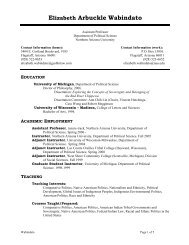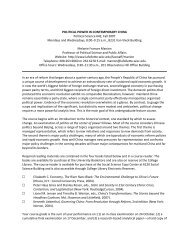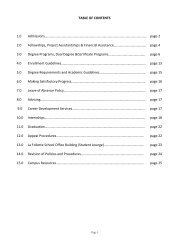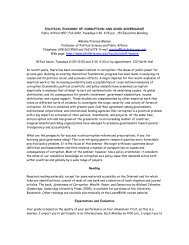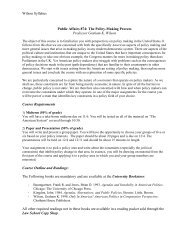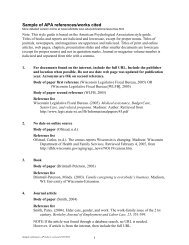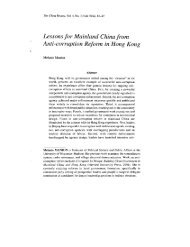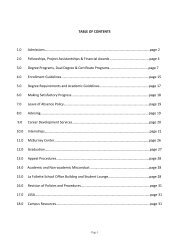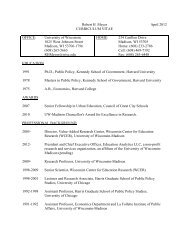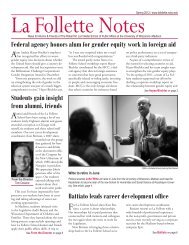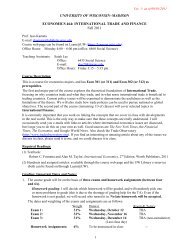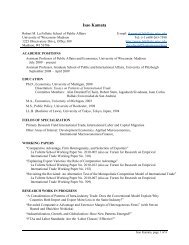SAVE Commission's findings - La Follette School of Public Affairs ...
SAVE Commission's findings - La Follette School of Public Affairs ...
SAVE Commission's findings - La Follette School of Public Affairs ...
Create successful ePaper yourself
Turn your PDF publications into a flip-book with our unique Google optimized e-Paper software.
NEW MANAGEMENT SYSTEM<br />
State government already has a budget<br />
system. Now it needs a management system that<br />
uses one management language so agencies are<br />
all speaking out <strong>of</strong> the same manual. It also<br />
needs a system that places a high value on measurable<br />
results.<br />
At the top <strong>of</strong> the system will be the common<br />
mission, not only for state agencies, but<br />
all <strong>of</strong> state government. Under the strategy, the<br />
state will develop the large share <strong>of</strong> its programs<br />
based on the assumption that citizens have responsibilities<br />
as well as rights and that with<br />
those citizenship responsibilities comes the expectation<br />
that there will be some things you do<br />
for yourself. Government cannot do everything<br />
for you.<br />
Under the mission, budgets will be developed<br />
based on the results that the Governor<br />
and Legislature want. Where possible, benchmarks<br />
will be set, against which agency performance<br />
will be measured. The best examples <strong>of</strong><br />
performance in and out <strong>of</strong> state service will be<br />
shared so state workers know what they are<br />
competing against. Then management will get<br />
out <strong>of</strong> the way and measure the results at appropriate<br />
times.<br />
In the end, the results will be reported<br />
not only to the Legislature and the Governor,<br />
but also to taxpayers in a new report card. The<br />
report card will have the information needed<br />
to know not only results that have been<br />
achieved but also the per unit costs <strong>of</strong> the results.<br />
Over time, the system will tell the Governor<br />
and Legislature whether they are getting<br />
their money’s worth and whether other alternatives,<br />
including the use <strong>of</strong> private vendors or<br />
other public employees, are in order, assuming<br />
a level playing field with public employees.<br />
Footnote: The Commission appreciates<br />
the time taken by thousands <strong>of</strong> state employees<br />
whose opinions helped form these recommendations,<br />
especially in the areas <strong>of</strong> civil service,<br />
procurement and management systems<br />
reform. Wisconsin is fortunate to have public<br />
employees who are generally performing excellent<br />
work in an antiquated system under<br />
sometimes difficult conditions.<br />
From a budget system that:<br />
Is line item focused<br />
Appropriates in minute detail<br />
Has incentives to spend<br />
Decides infrastructure piecemeal<br />
Funds by agency requests<br />
Tolerates units’ under-performance<br />
Reports spending to citizens<br />
From a civil service system that:<br />
Devalues and disrespects workers<br />
Centralizes authority<br />
Has 2,400 job classes<br />
Pays for time worked<br />
Dictates pay by job class<br />
Hides true costs <strong>of</strong> paperwork<br />
Ignores workers’ knowledge<br />
From a management system that:<br />
Runs by rules<br />
Protects bureaucratic turf<br />
Manages the budget inputs<br />
Has little unit-cost data<br />
Fixes only what is broken<br />
Has incompatible systems<br />
Has layers <strong>of</strong> impeding oversight<br />
From a procurement system that:<br />
Focuses on process<br />
Has checkers checking the checkers<br />
Focuses on price alone<br />
Disregards the time <strong>of</strong> paperwork<br />
Is adversarial by nature<br />
Uses micro management<br />
Procurement specialists control<br />
To a budget system that:<br />
Is strategic and output focused<br />
Funds for specific results<br />
Has incentives to save<br />
Plans and integrates infrastructure<br />
Funds by core result areas<br />
Moves work to performing units<br />
Reports results to citizens<br />
To a human resource service<br />
system that:<br />
Respects workers’ potential<br />
Delegates appropriate authority<br />
Has broad bands <strong>of</strong> job classes<br />
Pays for skills and results<br />
Ties compensation to total market<br />
rate<br />
Rejects non-value-added red tape<br />
Values knowledge as capital asset<br />
To a self-managing system that:<br />
Operates with strategic guidance<br />
Cooperates across agencies<br />
Manages for strategic results<br />
Knows costs and benchmarks<br />
Continuously improves<br />
Has all conform to comprehensive<br />
standards<br />
Has trust in a verified system<br />
To a procurement system that:<br />
Focuses on customer<br />
Holds everyone accountable<br />
Calculates total value<br />
Believes time is money<br />
Uses partnerships to deliver value<br />
Gives freedom; requires results<br />
Lets workers manage the budget<br />
CITIZEN • COMMUNITY • GOVERNMENT — WISCONSIN: THE 21 ST CENTURY 55



